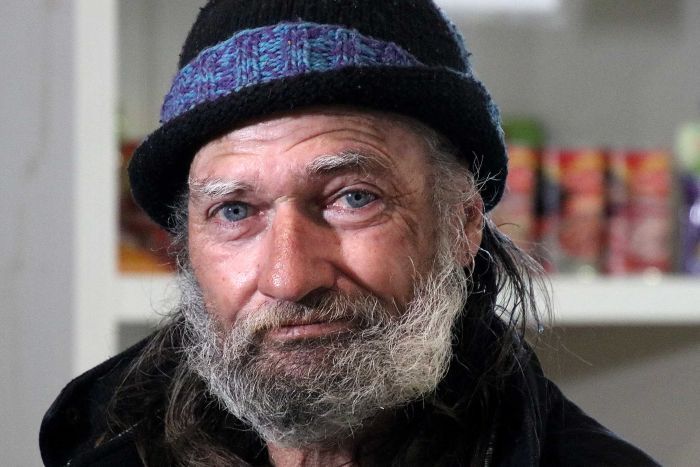- Catholic Social Services WA
- +61 8 9220 5950
- csswa@perthcatholic.org.au
Mandurah’s waterfront hotels and houses mask a homelessness crisis on the foreshore

PHOTO: Steve Bond says Mandurah is an attractive destination for people who are homeless. (ABC News: Rhiannon Shine)
WA’s biggest regional city is grappling with a rise in rough sleepers on its centrepiece waterfront, with the situation becoming so bad the City of Mandurah is now calling on the State Government for support.
Key points:
- Up to 90 people are estimated to visibly be sleeping rough in Mandurah
- The council is reporting a steep increase in complaints about anti-social issues
- There are calls for the State Government to step in and help fund services
Once a sleepy holiday town, Mandurah is now a thriving city of more than 85,000 people with a direct train link to Perth’s CBD.
But with that rapid growth has come a rise in social issues, including an increase in the number of people homeless and sleeping rough.
The image of people sleeping on Mandurah’s estuary foreshore has become commonplace in recent months, with a backdrop of waterfront hotels and expensive houses highlighting the city’s stark wealth divide.
Like anywhere else, the reasons behind Mandurah’s rise in homelessness are many and varied.
But a higher-than-average unemployment rate, drug and alcohol issues, and low incomes have all contributed to the problem.
‘There’s nowhere to sleep’
A visit to the Peel Community Kitchen at lunchtime highlights the number of people struggling.
Kitchen coordinator Tracey Bain said when it opened a decade ago, the community-run service would feed about 40 people.
Today the team of volunteers feed 120 people on a busy day, out of a small hall in the centre of town which the service has well and truly outgrown.
“In Mandurah I think you can get everything other than accommodation,” Ms Bain said.
“They can eat, they can shower, they can get clothes, they can get help in that respect. But there’s nowhere to sleep.”
Steve Bond, who lives on the streets of Mandurah, said the wide range of services available through charitable organisations were what made the city attractive to people who were homeless.
“For me, it’s good, I like it,” he said.
“I know how to survive, know where to stay, where no one will threaten you or harm you.”
He got meals at the community kitchen and accessed support services and clothing at non-government organisation Halo, located just over the road from the community kitchen in the centre of town.
“They provide a lot of goodness and purity to the homeless and all those people in homes themselves struggling,” he said.
“You’ve got your toiletries and your food here [at Halo]. They can provide everything you need.”
Mr Bond said many of the rough sleepers in Mandurah came down on the train line from the Perth CBD.
“[In Perth] they’re just telling them to move on all the time, so they come down to Mandurah and get out of the city,” he said.
Halo founder Dee Freitag said demand for the organisation’s services — which included one transitional homeless shelter, welfare, a soup kitchen and outreach support — had doubled since it opened five years ago.
“You’ve got people who are homeless on the street, then you’ve got people who are homeless couch surfing, then you’ve got people who are homeless in their car, then you’ve got people who are at risk of homelessness, and you’ve got people who are sharing,” she said.
“It’s big.”
From well-paid to homeless
Stephen Reynolds lived in his car in Mandurah for three years after losing his job as a heavy machine operator during WA’s mining downturn.
He now lives in Halo’s transitional homeless shelter, helping at the organisation’s op shop during the day.
“Going from a pretty well-paid job to pretty much nothing in your pocket and not really knowing what to do or who to turn to was a bit difficult,” he said.
“[There are] a lot of bad reports of the people staying on the streets and all that, but you know, we’re not all as lucky as some people.
“We need more places where we can stay. It’s not their fault, it’s a rut you get into and it’s hard to get out of it.”
In response to the growing number of rough sleepers, the City of Mandurah and WestAus Crisis Care started a shower service, which is located away from the tourist precinct in central Mandurah and has been used by about 100 people since opening a year ago.
The City of Mandurah also recently voted to relocate the Peel Community Kitchen to a bigger building next to the homeless showers to enable it to service a growing population of homeless people.
Anglicare’s Peel service manager Michelle Peter estimated there were between 70 and 90 people sleeping rough in the Mandurah area.
“And that’s just the people we see visible on the streets,” she said.
“There are many people that are couch surfing or living in accommodation that’s not really suitable for families or individuals.”
Complaints about homeless people rise
The minutes from a recent City of Mandurah council meeting stated the issue had grown over time, “from the occasional rough sleeper or street-present person begging for money to a more regular cohort”.
“The group is almost always visible through daytime hours and into the evening and this has resulted in a steep increase in complaints from a wide range of affected people, including businesses, residents and tourists.”
Mandurah mayor Rhys Williams said the city would use a meeting on Wednesday night with government representatives including Mandurah MP David Templeman, Police Minister Michelle Roberts, the Mental Health Commissioner and Deputy Police Commissioner, to ask for help.
“We don’t want these issues to define us as a community,” he said.
“We’re asking Government for an increase in police presence in our city centre, ongoing.
“We’re asking for a significant contribution to outreach services so there’s a constant outreach service in the city centre.
“And also a mental health co-response — so that’s mental health workers working alongside police officers for those people who are experiencing mental health issues in the city centre, so they can get the support that they need.”
Garden shed became a family home
Julianne and Phil Vidler are examples of the unseen homeless population struggling within the city.
The pair live in a tin shed at the back of a friend’s property in a suburb on the outskirts of Mandurah.
Ms Vidler became unemployed following a workplace accident and Mr Vidler gave up work to care for her. They now got by on disability and carer’s pensions.
“We were living in a place, but the rent was very high and unfortunately they couldn’t reduce it to what we could pay,” Ms Vidler said.
“We had to move out, and [a neighbour] offered us their shed.”
Mr Vidler said the situation had taken a toll on their mental health.
“It’s depressing when you’ve got nowhere to work, or you can’t work, and you’ve got nowhere to live,” he said.
“How are you meant to get over that? That’s really hard.”
Former FIFO workers among needy
Debbie Trimmer from WestAus Crisis Care said while accommodation for people sleeping rough was undoubtedly an issue for the city, the greatest need was for more suitable accommodation for families in the region.
“The demand for services has been linked to an increase in unemployment in the Peel region, fly-in, fly-out workers have lost their jobs and they may have large mortgages, [there is] a lack of accommodation and mental health [issues],” she said.
“We have also seen an increase in people presenting due to their homes being repossessed through the banks.”
Liberal member for Dawesville Zak Kirkup said a number of residents were worried about people staying in local parks, on the estuary foreshore and in the central business district.
“It’s important that the State Government works with the local council to try and address the issue of homelessness and street-present people in our regional city,” he said.
Department of Communities acting assistant policy director Ben O’Rourke said $1.5 million was provided for homelessness support services in the Peel region, and a further $1.7 million for family and domestic violence services.
While admitting there was “much more work to be done”, Mr O’Rourke said a 10-year strategy was being developed to look at better ways of helping homeless people access accommodation and support.
This article first appeared in abc.net.au







